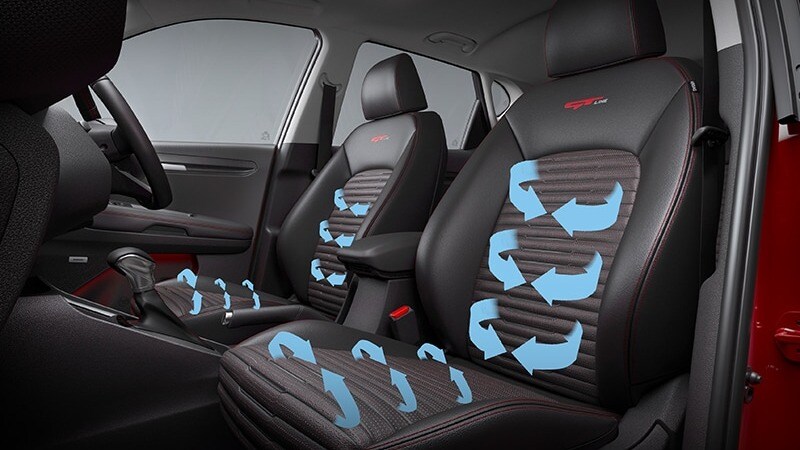OverdriveAug 10, 2020 18:16:34 IST
Kia Motors India have announced and showcased their all-new Sonet, a compact SUV that sits under 4 m in length and is their third product for India following the blockbuster Seltos and the luxury MPV, the Carnival. The Sonet will take on the likes of the Hyundai Venue, the Maruti Suzuki Vitara Brezza and the soon to be launched Toyota Urban Cruiser. We got a quick look at the production version of the Kia Seltos and its pretty close to what was revealed earlier in the year at the 2020 Auto Expo before the COVID pandemic took hold of India.

2020 Kia Sonet
Kia Sonet Exterior Design
The design elements on the Kia Sonet are quite close to the prototype showcased in Delhi. The gold shade on the Sonet proto we are told will continue to be offered in the range, but the SUV we saw came in a shade of red with the GT Line trim detailing evident all over. It’s a busy front end with a lot of design elements clambering over each other for your attention. The grille is the most prominent area, it’s narrow, with a cleft on the bumper and hood lending that characteristic Kia feel. The grille itself is a honeycomb mesh, with red GT Line accents standing out. The honeycomb structure isn’t all hollowed out, just four of those hexagons allow air to pass into the engine bay and for the intake, with the rest blocked up. A chrome bezel around the grille adds a premium touch to the Kia Sonet that customers, even in this segment, demand.
At the top-right edge, the GT Line tag also sits on the grille, though its easy to lose sight of it with those red accents on the grille. On either side of the grille are the LED headlamps and what I do like is that they sit higher up on the SUV unlike some of the Sonet competitors who have them oddly positioned lower down. These lamps units are also slim, are dominated by a light daylight running LED graphic and wrap around themselves around the corners of the Sonet. The entire graphic enveloping the headlamps and the grille gives the Seltos a wide appearance from the front end, visually much wider than anything else in the segment.
Further down the bumper has several elements to it as well. It has driving lamps and I presume these will have a cornering function, switching on and off at night depending on the position of the steering wheel. There is yet another honeycomb grille on the bumper with two large vanes on either side of the grille. The surrounds on those and the lower lip are a shiny silver plastic fibre additionally weighing in on our tastes for all things shiny and bright.
Like that front end that makes the Sonet appear wider than it actually is, the side profile also shows off larger proportions that what is. The optics on the Sonet especially towards the rear give it a sense of largesse, led by the quarter glass behind the C-pillar and the inverted body coloured D-pillar. The interesting bit about the D-pillar on the Sonet is that it, extends to the roof without interruption and also integrates the rear spoiler. Along with that black roof you don’t just get a regular floating roof effect, but one that looks a bit more stylish than average. Flanking the windscreen are two plastic panels with horizontal slats, that aid aerodynamic efficiencies, much like the roof fin. The shoulder line sits moderately high, and this leads to large glass areas on the windows that allow light to pass through easily and make the interiors feel roomier.
The Kia Sonet sits on 205/60 R16 profile tyres and those chunky 5-spoke wheel patterns are quite impressive. I quite liked the red brake calipers and the red hub cover on the wheels which add a very sporty touch to the exterior look. Would this tyre size be standard across the range, I’m not certain. For the sake of efficiency and cost, I presume, lesser variants would have 15″ wheels and tyres. Kia would also offer I’m sure more patterns for the alloy wheels. More when we have the full detailed feature and specification list.
At the rear the LED tail lights with the 5 block pattern also look quite impressive once the lights come on. The rear also has a smooth high-gloss mirror finished air diffuser extending from under the bumper on whose either side sit two large and very sharp looking dummy exhaust vents.
Kia Sonet Interiors
Stepping into the cabin of the Kia Sonet you get a reasonably generous sense of space thanks to the large glass areas. The GT Line seats are firmly cushioned with decent lumbar. The dashboard is dominated by the large 10.25-inch touchscreen and the flat bottomed steering wheel though I feel those vertical air-con louvres also equally grab a lot of attention since its not often you see vertical appendages like those. There is a lot of detailing on that dashboard with several textures playing up. Knurled finishes on the air-con vents, the gear shifter housing bezel and the smooth flat tones of the black mirror finished plastic on the touchscreen and instrument cluster create a lot of drama. Despite several elements and each treated in an entirely different manner, it all comes together tightly!
I even liked the ribbed effect on the seat upholstery with the red detailing. My only sore point was the buttons for the air-con controls which felt plasticky and a bit out of place on this otherwise good looking dashboard. The second row of seats is also quite comfortable and space is packaged cleverly to offer enough leg room for second row passengers. For instance the exhaust tunnel running through the length of the car has a very small hump protruding into the floor of the cabin. It is not a completely flat floor, but low enough to ensure it does not intrude. Three could sit abreast in comfort over short trips, but over longer outstation journeys this could be a bit tiring. Rear seat passengers also get air-con vents.
Kia Sonet Features
Apart from the touchscreen which has several layers and multiple windows to scroll through, the one most important feature that will catch your eye is the Bose sound system. The high end audio system that also has a built in sub-woofer housed cleverly in the boot without interrupting boot space will find several takers. What we aren’t sure of is if this would be a stand-alone feature in the top of the line variants or if it would be available in lower variants as well. You also get an air purifier, like in the Seltos, except this comes with a virus protector, and I don’t know how that works and just how effective is that going to be, but its clever marketing spin in these times. Another highlight is the ventilated seats for both front passengers, and this I’m sure would be a highly appreciated feature anywhere in the country.

Sonet seat ventilation. Image: Kia Motors India
Kia Sonet Powertrains
The Sonet I saw had a 1.5-litre diesel engine sitting under that clamshell like bonnet. It’s a turbo-charged unit and peak power output should be similar to the Venue, 100PS with 240Nm max torque. It will also be available with a 1.0-litre turbocharged petrol engine (dubbed the G 1.0 T-GDI) and the 1.2-litre naturally aspirated petrol (dubbed the Smartstream G 1.2 Petrol). Kia has already revealed that it would offer the new iMT transmission which is the intelligent automatic transmission, which is a derivative of the 6-speed manual. The version we were shown, has a standard 6-speed torque convertor automatic. This would be a first for the segment, as no other manufacturer offers a diesel automatic. This would definitely go a long way in luring customers to the Kia Sonet. You can find more details here. Other transmission options will also include a 7-speed DCT which would be mated to the 1.0-litre petrol and a 5-speed manual that would go with the 1.2 petrol and the diesel. So lots of variants providing immense choice again.
There are all the makings of yet another blockbuster from Kia, now to get our hands behind the wheel and drive it to see what the Kia Sonet is like on our roads.
[embedded content]
Find latest and upcoming tech gadgets online on Tech2 Gadgets. Get technology news, gadgets reviews & ratings. Popular gadgets including laptop, tablet and mobile specifications, features, prices, comparison.
Post a Comment